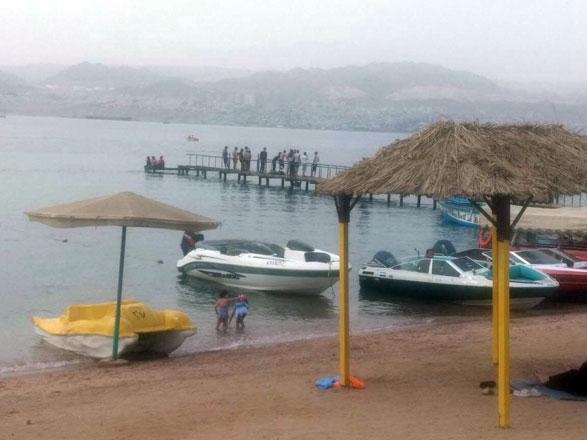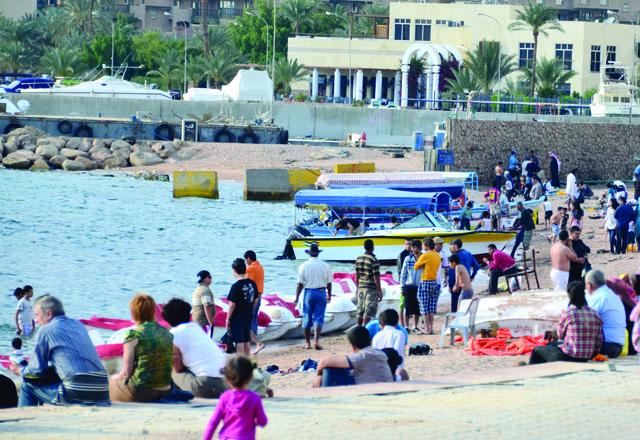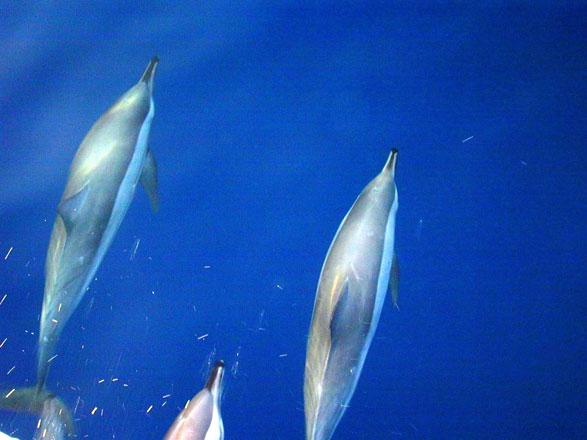You are here
Public safety issue makes waves on Aqaba public beaches
By Hana Namrouqa - Jan 13,2018 - Last updated at Jan 13,2018

Civil society institutions and NGOs in Aqaba, Jordan's sole seafront, have been rallying local support for a year now for improving the safety conditions and quality of services at Aqaba's public beaches (Photo by Hana Namrouqa)
AQABA — Raya and her sister Sumaya were pouring water at each other’s heads on a beach in Aqaba on an unusually warm January when their mother rushed to the water and snatched them as a speedboat approached the shoreline.
The two girls mumbled their rejection to their worried mother and ran back to their floating pink buckets. They continued splashing as they were almost crammed between parked motorboat and pedal boat.
Their mother sat on the beach and watched nervously.
“I am worried that one of the boats would bump into them as it parks or leaves the shore, it could happen you know.., everywhere I look, there are boats either parked, leaving the beach or cruising nearby,” Siham, the young mother of the two girls, said.
A few metres away was another family sitting on the beach. The mother and father stood by their children as they played in the shallow water.
“The beach is busy today because it is the weekend and the weather is pleasant. You need to be extra vigilant with children playing in the water as the boats are coming and leaving,” Fouad Abu Sneneh, a father of three children aged between nine and six-months, said.
The Aqaba resident said that he takes his family to the beach almost every Friday noon when the weather is warm.
“There’s not much things to do for fun around here, the beach is our only getaway. My wife and I take the children to play at public beaches,” Abu Sneneh said as he stood watching his children playing on the popular Palm Public Beach, locally referred to as the Ghandour beach.
The “uncontrolled movement of pedal, glass and speed boats”, is not the only concern for beach goers of the Ghandour beach, according to Rania Msallam, a resident of Aqaba.
“The sand of the beach can be really dirty…, there are broken glass, cigarette butts, water bottles and plastic cups here and there, let alone, the dirty and primitive toilets,” Msallam complained.
The mother of five said that her family “cannot afford private beaches, where services and cleanliness are much better,” leaving public beaches as their only choice.
“I wish that the public beaches be improved and more regulated,” she said.
Civil society institutions and NGOs in Aqaba, Jordan’s sole seafront, have been rallying local support for a year now for improving the safety conditions and quality of services at Aqaba’s public beaches.
Eighteen civil societies, NGOs and institutions formed an alliance to advocate for better public beaches and push the Aqaba Special Economic Zone Authority (ASEZA) to qualify one of the public beaches to hold the blue flag, a voluntary eco-label that indicates a certain beach or marina is clean, accessible and has high safety standards.
The campaign “Right to Safety on Beaches” argues that everyone has the right for highest levels of safety on public beaches, urging ASEZA to “build on its achievements in improving the state of the Ghandour public beach by providing basic safety requirements”.
The campaign urged ASEZA to deploy lifeguards at the Ghandour beach and to divide the beach into dedicated zones for swimming, fishing, glass boats, speedboats and water sports.
It is also urging ASEZA to provide permanent first aid units, erect “clear and sufficient” warning and instruction signs, establish sufficient and “fit for use” public toilets and matt the beach to provide people with disabilities with a path to reach the water.
Ehab Eid, executive director of the Royal Marine Conservation Society (JREDS), called on ASEZA to work for announcing at least one of Aqaba’s three public beaches as a “blue flag public beach”.
“Our claim to consider the implementation of the blue flag programme at Aqaba’s public and private beaches is based on various reasons, including but not limited to the contribution of this programme to economic growth.”
Eid indicated that Jordan’s National Green Growth Plan identified blue flag beaches as an investment opportunity in the tourism sector.
“We are also pushing for having a blue flag beach for its role in creating a suitable environment for beach visitors due to the safety criteria the world-renowned programme necessitates as well as the benefits it secures for marine environment conservation,” Eid told The Jordan Times.
JREDS, one of the NGOs advocating for safety on public beaches under the “Right to Safety on Beaches” campaign, offered ASEZA its expertise in the field.
Eid expressed JREDS’ keenness to offer its capacities, knowledge and expertise in promoting sustainable development in Aqaba, and to work hand-in-hand with ASEZA.
“We urge ASEZA to unlock the doors and initiate a dialogue to benefit from the benefits of the blue flag programme and achieve sustainable growth in Aqaba,” Eid told The Jordan Times.
ASEZA Environment Commissioner Suleiman Najadat underlined that the authority has created recently a specialised unit dedicated for the management of Aqaba’s beaches.
“We drew up a plan that regulates the usage of the beaches, whereas the beach has been divided into zones for different uses to provide safety for beach goers. Now, to soundly implement this, we need the cooperation of owners of boats to ensure the safety of swimmers and beach visitors,” Najadat told The Jordan Times.
The ASEZA official also highlighted that beach goers should assume responsibility to avoid accidents while on the beach, inviting them to strict swimming activities to the part of the sea lined with floating yellow plastic balls.
Commenting on the campaign’s calls for deploying lifeguards on Ghandour public beach for a starter, Najadat said that the authority has erected several signs and warnings, noting that visitors of public beaches “swim at their own peril”.
“We are applying all safety requirements and services necessitated by the blue flag programme without having to announce a certain public beach as a blue flag beach,” he said.
Najadat highlighted that ASEZA is in the process of establishing a marina for fishermen and all types of boats, highlighting that the presence of boats on public beaches will be prohibited in the future when the project is completed.
Meanwhile, director of Operations and Logistics Support at the Ghandour beach, Khaled Adaileh, said that an ambulance from the Civil Defence Department is now stationed by the beach during weekends when the number of visitors increase.
“No drownings nor injuries took place at the Ghandour beach in the past six months,” he said.
But the campaign demands the unit to be stationed daily.
“Injuries and drowning cases don’t only happen at weekends and public holidays. A lifeguard and a permanent first aid unit are basic requirements for a busy and popular public beach such as the Ghandour, which is located in the heart of Aqaba,”Ebtihal Tarawneh, Outreach and Advocacy Programme Manager at JREDS, said.
On the right of people with disabilities to easily access the beach, Adaileh said that work is now in progress to establish a path that takes people with disabilities to the sea without the help of anyone.
The official said that to improve and sustain the level of services at public beaches, people need to cooperate and civil societies need to help in building awareness, noting that the beach’s infrastructure is often sabotaged by some beach visitors.
On deploying lifeguards, Adaileh said that he is against the suggestion.
“We have employees who observe practices at the beach, at the same time people also should abide by beach safety instructions,” Adaileh said.
As another day on the beach came to a close, Siham, the mother of Raya and Sumaya, hoped for a beach experience devoid of constant safety concern.
Related Articles
One to two square kilometres of Aqaba’s public beaches are lost every year to investment projects, according to marine conservationists.
AMMAN — The Aqaba Special Economic Zone Authority (ASEZA) has created five new diving sites in the Gulf of Aqaba to provide more locations f
AMMAN — More than two-and-a-half months of the coronavirus-induced lockdown has helped marine creatures to reclaim their space in the ecosys


















